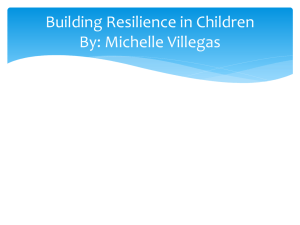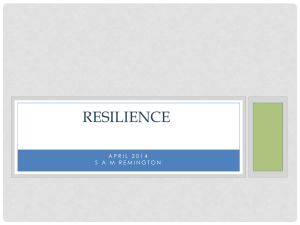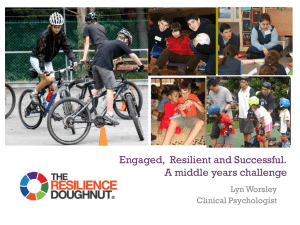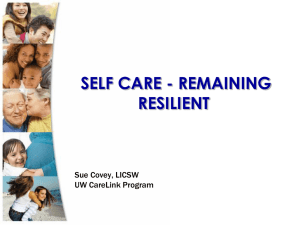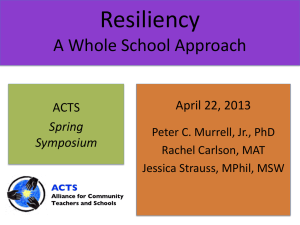Building Your Bounce - 2015 Early Childhood Inclusion Institute
advertisement
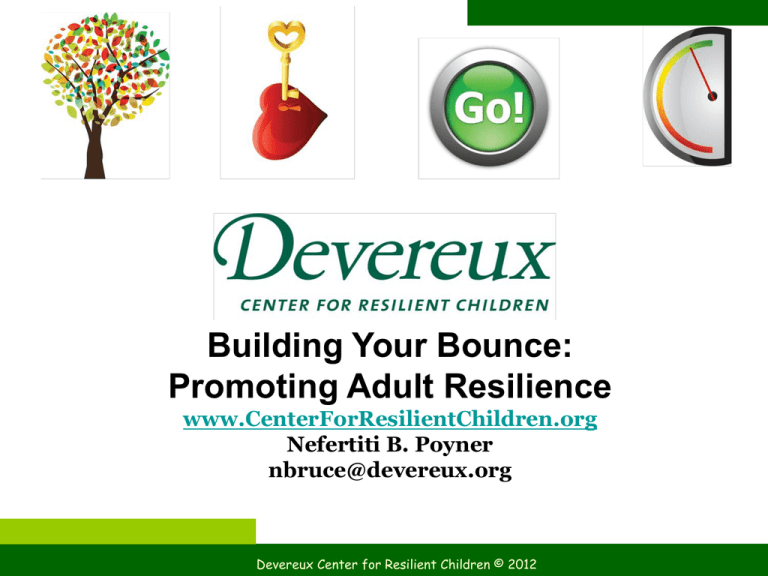
Building Your Bounce: Promoting Adult Resilience www.CenterForResilientChildren.org Nefertiti B. Poyner nbruce@devereux.org Devereux Center for Resilient Children © 2012 Devereux Center for Resilient Children (DCRC) • The mission of the DCRC is to promote social and emotional development, foster resilience, and build skills for school and life success in all children and the adults who care for them Devereux Center for Resilient Children © 2012 Devereux Center for Resilient Children (DCRC) Negative: Vulnerability Positive: Resilience Devereux Center for Resilient Children © 2012 Devereux Suite of Assessments • Four strength-based behavior rating scales that measure within-child protective factors related to resilience – Each standardized on a nationally representative sample of children – Strong psychometric properties – Span infancy through 8th grade (1 month through 14 years) – Completed by parents and teachers Devereux Center for Resilient Children © 2012 The Need to Promote Adult Resilience Devereux Center for Resilient Children © 2012 Devereux Center for Resilient Children (DCRC) • The well-being and resilience of teachers needs to be promoted so they can in turn support children in acquiring social and emotional skills. Devereux Center for Resilient Children © 2012 • 22% of Americans report experiencing extreme stress • 39% of Americans report that their stress has increased over the past year • 44% of Americans report that their stress has increased over the past 5 years • Significant sources of stress include: • money (75%) • work (70%) • the economy (67%) • relationships (58%) • family responsibilities (57%) What risks resonate with YOU right now? Teacher Stress • Sources of teacher stress: – Demands of school reform efforts (NCLB) – Administrative demands - excessive paperwork, severe time constraints (Kyriacou, 2001; Lambert et al., 2009) – More children with problem behaviors, lacking motivation, or coming to school sleepdeprived (McCarthy & Lambert, 2006) Devereux Center for Resilient Children © 2012 Teacher Stress • Sources of teacher stress (continued): – More demanding or unsupportive parents (McCarthy & Lambert, 2006) – Lack of administrative support, poor working conditions, lack of resources (Hammond & Onikawa, 1997) Devereux Center for Resilient Children © 2012 Effects of Teacher Stress • Can lead to poor physical health • Headaches, gastrointestinal problems, cold and flu episodes, sleep disturbances, hypertension (Melamed et al., 2006) • Can lead to mental health problems Devereux Center for Resilient Children © 2012 …women working with children in Head Start programs have poorer Physical and mental health than do US women who have similar socio-demographic characteristics. Effects of Teacher Stress • Depressed mood, reductions in selfesteem and self-efficacy, decreased motivation, job dissatisfaction • (Burke et al., 1996; Jurado et al., 1998; Montgomery & Rupp, 2005; Santavirta et al., 2007; Schonfield, 2001; Tennant, 2001) Devereux Center for Resilient Children © 2012 Effects of Teacher Stress • Chronic stress can lead to burnout • Burnout is well-documented in education – More studies of teacher burnout than in any other professional group (Lambert et al., 2009) Devereux Center for Resilient Children © 2012 Effects of Teacher Stress • Characterized by: – Emotional exhaustion (fatigue, loss of energy) – Negative or cynical attitudes towards the job (job dissatisfaction) – Reduced personal accomplishment (feeling incompetent, low morale, reduced meaning or fulfillment with the job) (Guglielmi & Tatrow, 1998; Montgomery & Rupp, 2005; Santavirta et al., 2007; Tennant, 2001) Devereux Center for Resilient Children © 2012 Caring for the Caregiver: Promoting the Resilience in Teachers Jennifer R. Fleming Paul LeBuffe Mary A. Mackrain Reduced Teacher Availability Difficulty modeling appropriate social-emotional skills Direct Negative Effect on Children DCRC and Teacher Resilience • As we ask teachers to build the social and emotional well-being of children, we can’t forget that teachers’ own social and emotional well-being is important too Resilience: Formal Definitions • Ann Masten (2001) defined resilience as “good outcomes in spite of serious threats to adaptation or development”. • Lifton (1994) identified resilience as the human capacity of all individuals to transform and change, no matter what their risks, it is an innate “self-righting mechanism”. Devereux Center for Resilient Children © 2012 Resilience The ability to bounce back. The ability to overcome misfortune or change. How do you think about or define resilience? Introduction to the Devereux Adult Resilience Survey Devereux Center for Resilient Children © 2012 Development of the Devereux Adult Resilience Survey (DARS) • Development of the DARS began with a literature review of adult resilience. What behaviors are important to help adults bounce back in life? What behaviors do adults need to provide nurturing, quality care to young children? Devereux Center for Resilient Children © 2012 Development of the Devereux Adult Resilience Survey (DARS) • Step Two: Focus groups with families, early childhood caregivers and infant mental health home-based clinicians. • Step Three: Developed sample items from literature review and focus groups on what it means to be a resilient adult Devereux Center for Resilient Children © 2012 Development of the Devereux Adult Resilience Survey (DARS) • Step Four: Talked with national experts about the items, used their expertise to formulate “scales” or areas of focus in which the items fell. • Step Five: Completed a Construct Validity Study. • DARS is appropriate for its intended use (as a self-reflection checklist) Devereux Center for Resilient Children © 2012 Development of the Devereux Adult Resilience Survey (DARS) • DARS now available for free download at www.DevereuxCenterForResilientChildren. • The information can be used to help individuals build on these strengths, such as creativity and setting limits, so that they can better cope with the adversity and stresses of daily life. Devereux Center for Resilient Children © 2012 Psychometric Properties of the DARS • 721 early childhood teachers and caregivers • Sample had a distribution similar to the U.S. Census (2007) population data with regards to race, ethnicity, and age • More females participated than males • Completed the DARS and the Connor-Davidson Resilience Scale (CD-RISC) in counterbalanced order • CD-RISC is a 25 item scale comprising four factors related to resilience • Personal competence, intuition/coping, secure relationships, and spiritual influences Psychometric Properties of the DARS • Reliability: • High internal consistency (a = .76) • Items on the DARS correlate highly with one another • Construct Validity: • Correlated highly with CD-RISC scores (Spearman rho = .58, p = .01) • DARS measures behavior related to resilience • Statistical analyses were not statistically significant for men and woman • DARS is appropriate for its intended use (as a self-reflection checklist) Building Your Bounce Devereux Center for Resilient Children © 2012 Complete a DARS Devereux Center for Resilient Children © 2012 We may not have time for everything, but can we begin to make time for the most important things? Are you ready to make yourself a priority? NEED PHOTO NEED PHOTO “If you concentrate on finding whatever is good in every situation, you will discover that your life will suddenly be filled with gratitude, a feeling that nurtures the soul. - Rabbi Harold Kushner Improved Health Reach More Goals Gratitude What goodness has been brought into your life already? Take a few minutes to generate a mental or written list of two or three things you are grateful for. The most powerful agent of growth and transformation is something much more basic than any technique; it’s a change of heart - John Welwood T h a n k y o u Reflection What would happen in my personal and professional life if I took time to nurture my resilience? When the blues just won’t go away… We are in this together! Are there any questions? “If we believe that our lives and organizations will always include adversity, disruptions, surprises and systemic shocks, opening up to a further investigation of resiliency might be a purposeful and a survival skill.” http://blogs.edweek.org/edweek/leadership_360/2013/06/resilience_for_our_students_and_ourselves.html Thank You! For additional information please contact: Debi Mahler Director of Professional Development dmahler@devereux.org


